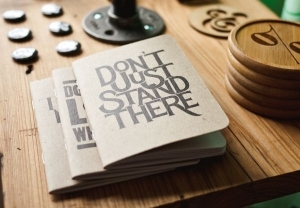 I couldn't imagine a worse way to spend my time. I think being mugged and savagely beaten could've been less agonizing. At least the beating would've been over in a few minutes. This went on for an hour.
I couldn't imagine a worse way to spend my time. I think being mugged and savagely beaten could've been less agonizing. At least the beating would've been over in a few minutes. This went on for an hour.
I now give you The Best Sales Techniques You Can Learn from The Worst Sales Presentation, in three acts.
I hope you don't make sales presentations like this.
Act 1 - How It Started
We were landscaping our yard. After a couple years we finally decided to finally rip out the hideous landscaping, and make the outside of our home "ours."
A few of our neighbors replaced their windows with better, energy efficient windows. I saw a few signs in the yards and decided to call.
Why not?
I'm spending a small fortune to replace the yard, let's see what I can add to the bill. I'll be able to admire the new landscaping through new glass and save a few dollars on our electric bill.
The guy arrives at my door. I answer.
"Are you Matt?" he asks. Side Note: To help you keep track of the questions he asked, I'll count them for you. This was his first question.
"Yes, you must be Bob. Come in." (I've changed his name, mainly because I can't remember it and "Bob" is easy to type.)
Bob and I sat at the kitchen table. My bride sat on the couch without any desire to listen but could see and hear everything.
I offer Bob a drink and he says "No thanks."
He immediately opens an iPad and props it up so I can see the screen. He proceeds to flip from slide to slide telling me about his company.
"You'll get a deal because you called off the signs in your neighbor's yard. And when you let us put a sign up for 60 days after the installation, you get another deal on the price. That way we don't have to pay for advertising…"
He didn't attempt to gain any rapport. He didn't ask any more questions, none.
He continued on this rant for about 3 minutes before I stopped him. This was about 2 minutes more than I should have let him continue.
"Stop," I said. "I don't care about your company's advertising. I want to know about the windows and find out the cost. Can we get there?"
"Um. Okay. I have to tell you about the warranty though. Can I quickly tell you about the warranty?" – His second question in the entire sales process.
(Since I'm helping you keep count here, he's asked me two questions. One was my name, the second was if he could tell be about his company's warranty.)
One of the best sales techniques you will ever learn is how to ask questions. You want to ask question about your customer's situation. Find out what's important to them. Ask rapport building questions. Ask, ask, ask, long before you consider talking about your product or service. Always!
Act 2 – Going Down Hill
"Great. Sure." my sarcasm wasn't fully understood by him. "Tell me about your warranty."
I looked at my bride. She had a large grin on her face. She has no interest in new windows and enjoyed watching me writhe in frustration.
Bob proceeds to tell me about their lifetime warranty. "But," he says, "Our glass is so strong you'll probably never have to use it. It's the best glass the industry."
Then, despite their glass being unbreakable, he goes on to tell me about 3 other homeowners who have had their windows replaced under the warranty.
I said nothing.
I blinked.
I nodded.
I painfully smiled.
He continued on about their windows quality and began comparing it to the competition. The "discussion" of their warranty went on for about 25 minutes.
He finally asks, "Would you like to see a sample of our windows?" – His third question of the sales presentation.
I'm thinking, "No. I really want you to leave."
Instead I blurted, "Great idea, and then you can measure our windows and price it out." I'm fully vested now. I'm determined to discover the price on these magical, almost unbreakable, windows.
Think about the words that come out of your mouth. Don't say your product is unbreakable and then tell your prospect how other customers used your warranty because it broke.
A better sales technique would have been to tell me how strong they are and how they've only has a handful of claims. These claims were mainly by people who live on a golf course and are repeatedly bombed by golf balls.
Want a better way to show proof? Have testimonials, written or video, of people who used the warranty explaining how it was honored and how easily the company fixed everything.
Act 3 – Hitting Bottom
Bob went to his truck and came back in with the sample window. It was huge and he carried it in a giant protective case.
He gave a beautiful demonstration of how the window works. It had an interesting way of flipping down and around so we could easily clean the outside of the windows from inside the house.
It was a damn nice window. He should've done this first, since he wasn't asking questions.
After his demo he asked if he could count and measure the windows to price them out. – This was the fourth question of the worst sales presentation ever.
Elated I said, "Yes! Let's go."
After walking through the house he goes out to his truck to put up the demo window and price things out.
My bride looks at me and asks, "This has to be absolute torture for you?" She has no idea.
We return to the kitchen table and Bob begins disparaging the competing window makers of the world.
As he continued bashing the competition he gives me the average price per window from each competitor. He hints at how expensive they all were.
I like the idea of setting price anchor points but don't talk about your competition. He didn't even need to bring up the competition. If he would've asked anything he would've known I wasn't shopping around.
And, more importantly, I don't care how bad your competition is; don't ever put down your competitors to your customer. It does nothing but make you look bad. Real bad.
Finally he pulls out his price pad and I begin to feel like I'm buying a car.
Half the sheet of paper is covered up and there's a very large number written across the top.
"$28,000 is what you would normally pay for these. This is the price if you made an appointment from one of our door-to-door guys or just called us up. But, because you called off the sign in your neighbor's yard, and you agree to put our sign in your yard for advertising," he unfolds the bottom half of the paper, "for you it's only $18,200."
I look at him deadpan. "Mmmmkaaayyy. Only $18,200? Okay. I'll think about it. We're getting ready to finish the landscaping and I'll call you."
He tried to overcome my delay but he knew nothing about me, my situation, or my reasons for replacing the windows in our home. He had nothing to ask or say at that point.
Want The Best Sales Techniques To Present With Authority, Power, And Control?
Ask more questions. Ask better questions. And improve your listening skills.
Your presentation can be won before you begin presenting by asking the right questions.
It can be lost with the question you don't ask.
Bob asked only four questions throughout his entire presentation. None of them were about me, my situation, or my reasons to buy windows.
In this situation the first question out of his mouth should have been, "Why are you buying new windows? When I look out the ones you currently have, I can see out of them just fine. Why are you considering this today?"
That will get the prospect talking about what he wants.
As the saying goes, you have two ears and one mouth, use them in that ratio.
Without asking the right questions you're wasting your time with 97% of your prospects. The other 3% will buy because they're already sold. You just have to keep yourself from talking them out of buying.
You can try to talk the 97% into buying what you sell without understanding their desires. But that's a lot of work.
A. Lot. Of. Work.
Or you can ask the right questions, and help your customer convince himself what you offer is the best option.
 Recently I was coaching a group of top producers. The lesson was about improving communication with your clients.
Recently I was coaching a group of top producers. The lesson was about improving communication with your clients. A friend told me this story recently.
A friend told me this story recently. I joke that if
I joke that if  I spent the day with over 100 4th, 5th, and 6th graders. They were business people.
I spent the day with over 100 4th, 5th, and 6th graders. They were business people. Reciprocity is one of
Reciprocity is one of  I couldn't imagine a worse way to spend my time. I think being mugged and savagely beaten could've been less agonizing. At least the beating would've been over in a few minutes. This went on for an hour.
I couldn't imagine a worse way to spend my time. I think being mugged and savagely beaten could've been less agonizing. At least the beating would've been over in a few minutes. This went on for an hour.